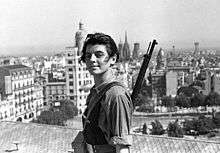Marina Ginestà
Marina Ginestà i Coloma (29 January 1919 – 6 January 2014) was a French-born Spanish veteran of the Spanish Civil War, and a member of the Unified Socialist Youth. She became famous due to the photo taken by Juan Guzmán on the rooftop of Plaça de Catalunya 9, 08002 Barcelona, Catalonia, Barcelona during the July 1936 military uprising in Barcelona. It is one of the most iconic photographs of the Spanish Civil War.[1]
Marina Ginestà | |
|---|---|
 Iconic photo of Marina Ginestà i Coloma by Juan Guzmán on top of Plaça de Catalunya, 9, 08002 Barcelona, Spain in 1936. | |
| Born | Marina Ginestà i Coloma 29 January 1919 |
| Died | 6 January 2014 (aged 94) |
| Occupation | Reporter |
| Known for | Iconic photograph |
Life
Ginestà was born in Toulouse, on 29 January 1919, into a working-class leftist family that had emigrated to France from Spain. Her parents were both tailors: Empar Coloma Chalmeta, from Valencia, and Bruno Ginestà Manubens, from Manresa. She moved to Barcelona with her parents at the age of 11. Ginestà later joined the Unified Socialist Party of Catalonia. As the war broke out, she served as a reporter and a translator assisting Mikhail Koltsov, a correspondent of the Soviet newspaper Pravda.[2] Before the end of the war, Ginestà was wounded and evacuated to Montpellier. As France was occupied by the Nazis, she fled to the Dominican Republic where she married. In 1946, she was forced to leave the country because of the persecution by the dictator Rafael Trujillo. In 1952, Ginestà married a Belgian diplomat and returned to Barcelona. She moved to Paris in 1978. Marina Ginestà died there at the age of 94 in January 2014.[1]
The Photograph
The famous photograph was taken on 21 July 1936. It shows the 17-year-old girl posing with a rifle on the top of the original Hotel Colón. Because she was a reporter, it was the only time Ginestà had carried a gun.[1] The picture was later used on the cover of the book Las Trece Rosas by Carlos Fonseca. The hotel was destroyed after the war and the site is now occupied by the Banco Español de Crédito building.[3]
See also
- Kozarčanka, World War II photograph showing a smiling female Partisan in Yugoslavia
References
- "Muere en París Marina Ginestà, la miliciana que fue un icono de la Guerra Civil" (in Spanish). Radio y Televisión Española. 6 January 2014. Retrieved 7 January 2014.
- "Muere Marina Ginestà, la sonrisa que plantó cara al fascismo" (in Spanish). Público. 6 January 2014. Retrieved 7 January 2014.
- "HOTEL COLON (II) Plaça Catalunya (1918-1941)" (in Catalan). Barcelofilia: Inventari de la Barcelona desapareguda. 16 February 2013. Retrieved 7 January 2016.